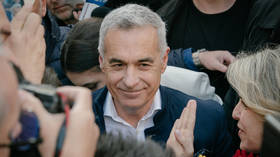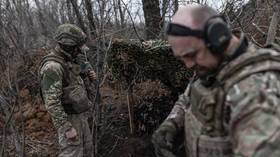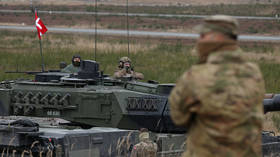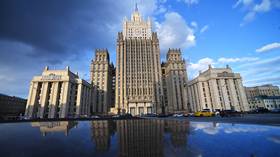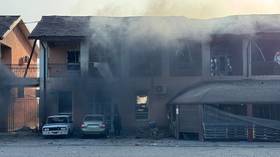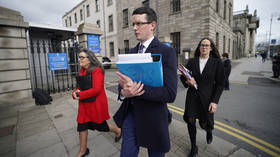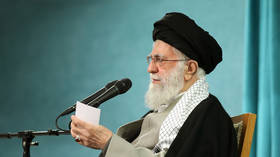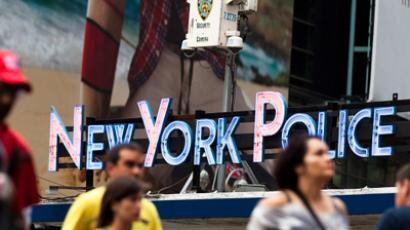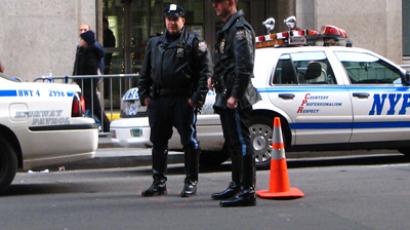Asking for trouble: NYPD announced it's ready for May Day violence
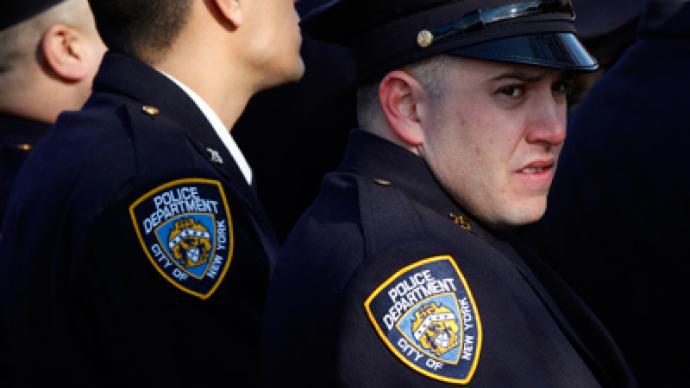
Thousands of demonstrators will descend on the streets of New York on Tuesday to engage in peaceful protests, but law enforcement in the Big Apple have already determined decided that there will be trouble.
Two days before Tuesday’s city-wide general strike is expected to get underway in New York — and over 100 other locales across America and even more abroad — the New York Police Department published a memo warning cops assigned to work the planned protests to expect violence and disruptions. Additionally, some officers of the law made unannounced visits on Monday to the residences of demonstrators who have publically acknowledged that they would be participating in Tuesday’s events.In an event advisory bulletin released by the NYPD on Sunday, April 29, law enforcement officers are presented with six-pages of bullet points that lay out facts and figures that they should take into consideration while patrolling the city during the general strike. Although organizers and planners within the Occupy Wall Street movement and the labor groups represented in the strike have insisted on protesting peacefully on Tuesday, the communiqué tells cops that they should expect the worst.“Occupy Wall Street (OWS) protesters are calling for a ‘General Strike’ on Tuesday, May 1, urging workers not to go to work and students to boycott classes in protest of what organizers characterize as society’s economic inequality,”begins the bulletin from the NYPD.“No unions are expected to participate in the strike, and some have talked to reporters about the fact that they weren’t consulted in OWS’s decision to announce a General Strike. Nonetheless, some elements of organized labor are expected to participate in their own customary May Day rally.”“Elements of OWS who objected to participation in a march with a permit have called for demonstators [sic] to engage in disruptive activities.”The memo goes on to caution cops of marches taking place without permits, protesters“potentially disrupting pedestrian and vehicular traffic”and the usage of“so-called ‘Black-Bloc” tactics to confront the police, sometimes violently,”citing as an example the 2009 G-20 Summit in Pittsburg, Pennsylvania that ended in nearly 200 arrests and widespread reports of injury.Buzzfeed reports that a NYPD spokesman Paul Browne has confirmed the authenticity of the memo.“We’re experienced at accommodating lawful protests and responding appropriately to anyone who engages in unlawful activity, and we’re prepared to do both,” NYPD spokesman Paul Browne explains to reporters this week of his plans for the general strike.“We will do what we normally do and find the right balance.”To some planning on getting involved on Tuesday, however, recent actions by law enforcement are anything but the ordinary."[T]here was definitely an upswing in law enforcement activity that seemed to fit the pattern of targeting what police might view as political residences,"Gideon Oliver, the president of the New York Chapter of the National Lawyers Guild, tells Gawker. Oliver spoke to the news site hours before the clock turned 12 a.m. on May 1 and told them that already he had heard reports of NYPD cops trying to preemptively disrupt protests by visiting the homes of known Occupy Wall Street members."They were asking what are your May Day plans, do you know who the leaders are—these are classic political surveillance questions,”adds Oliver.The National Lawyers Guild member also tells Gawker that by Monday evening, he had been made aware of no fewer than five recent incidences where law enforcement made surprise visits to the residences of protesters who planned to participate in the May First strikes."We obviously don't think it's an accident that it happened the day before May Day, where people in the house are organizers,"said one source who tells Gawker anonymously that he was visited by the NYPD on Monday at his Bed-Stuy, Brooklyn home."The intention behind this I'm sure is to try to create fear and silence dissent… and to keep people from coming out into the streets,"explains attorney Marina Sitrin to the website.During one of the last major Occupy-sanctioned events — last year’s march onto the Brooklyn Bridge that ended in roughly 700 arrests — investigators would later seize the personal tweets of at least one protester that was detained during the demonstration. Recently a judge overruled an attempt to have the subpoena delivered to Twitter, Inc. rejected, setting a precedent for law enforcement to use public online correspondence in the future if they can argue that it will help prove their case.




